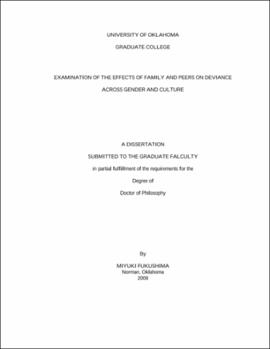| dc.contributor.advisor | Sharp, Susan F | |
| dc.creator | Fukushima, Miyuki | |
| dc.date.accessioned | 2019-04-27T21:41:30Z | |
| dc.date.available | 2019-04-27T21:41:30Z | |
| dc.date.issued | 2009 | |
| dc.identifier | 9996503902042 | |
| dc.identifier.uri | https://hdl.handle.net/11244/319353 | |
| dc.description.abstract | Using comparable self-reported survey data on deviance collected among college students in Japan (n=433) and the United States (n=363), I assess the applicability of Travis Hirschi's social bond and Ronald L. Aker's social learning theories across culture and across gender. Specifically, I examine first whether or not there is a difference in the level and type of deviance (both in terms of likelihood and frequency) between Japanese and American samples compared across gender, and the extent to which the two theories jointly and individually, address the questions: (1) can the two theories account for any differences in deviant behaviors among Japanese and American males and females? And (2) (if the two theories are applicable in explaining deviance among the Japanese sample,) is the applicability of these two theories similar or different for the Japanese sample compared to the American sample or for males compared to females across culture? | |
| dc.format.extent | 432 pages | |
| dc.format.medium | application.pdf | |
| dc.language | en_US | |
| dc.relation.requires | Adobe Acrobat Reader | |
| dc.subject | Deviant behavior--Cross-cultural studies | |
| dc.subject | Deviant behavior--Japan | |
| dc.subject | Deviant behavior--United States | |
| dc.subject | Social control--Japan | |
| dc.subject | Social control--United States | |
| dc.subject | Social learning--Japan | |
| dc.subject | Social learning--United States | |
| dc.title | Examination of the Effects of Family and Peers on Deviance Are Gender and Culture | |
| dc.type | text | |
| dc.type | document | |
| dc.thesis.degree | Ph.D. | |
| ou.group | College of Arts and Sciences::Department of Sociology | |
